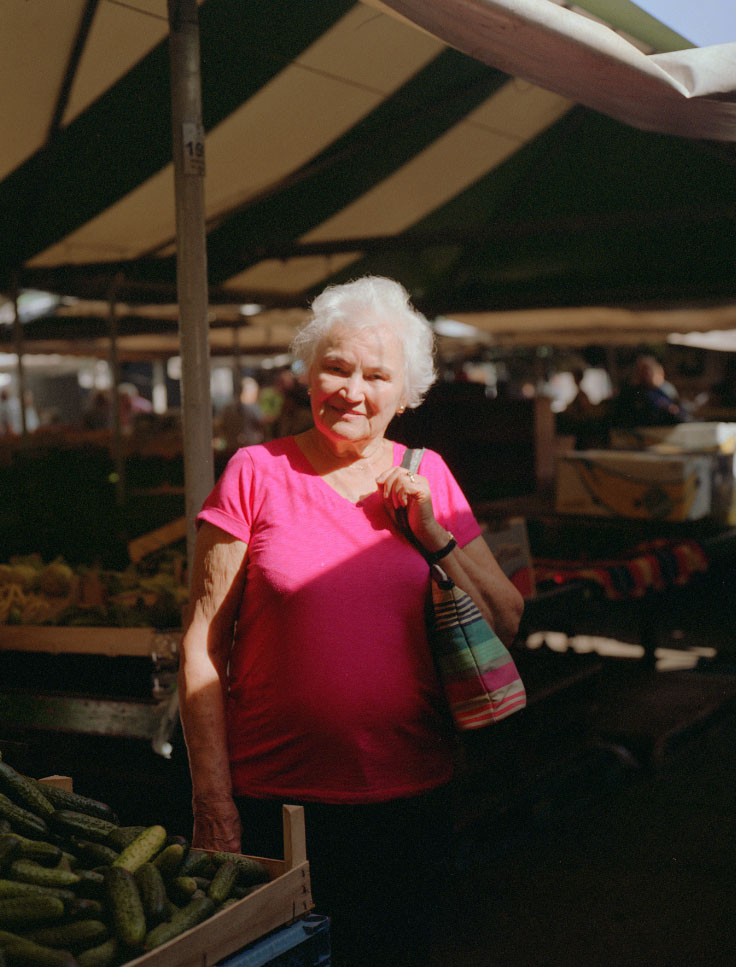Ania
Born, Suwałki, Poland, 1931
Mother Tongue, Polish
Grandchildren, Marcin, Magdalena, Karina, Krzysztof, Urszula, Jakub, Michał, Carla, Arthur
They call her, Babcia
I’ve loved being in nature ever since I was a child. We’d venture into the forests of Poland’s Masuria region, famous for its thousands of lakes, and fill two huge pails with wild blueberries from the forest, seal some of them in glass jars and then boil the jars in hot water to make a stash for the winter. The rest we would enjoy in situ while foraging or for lunch that same afternoon with pampuchy (steamed buns), naleśniki (blintzes) or even zupa jagodowa (blueberry soup).
These early memories were amongst the happiest I passed in that place. When World War II arrived, trips to the forest took on a different tone under Nazi fascism. At the beginning, we saw the Germans as good people. I remember in 1941, they stationed soldiers in our house and one of them brought me an orange because he said that I reminded him of his daughter. It got much worse later on, unfortunately.
My father was part of Armia Krajowa (the Polish Home Army), a subversive group of Poles that fought against the Germans during the entirety of the war. My mother was a liaison. Liaisons were undercover women, men, and children without whom there would not have been a Home Army. The AK, made up of men, hid out in the forests sometimes for weeks at a time. They put makeshift explosives on trains, built large weapons and worked with the British against the occupying Germans. I eventually learned that I conspired with the AK myself but at the time I had no idea.
My mother would put notes in my bag and told me to go into the forest and wait under the largest oak tree in a certain field. As I walked into the forest, German officers would ask me what I was doing. My mother told me to tell them, “I’m going to the forest to gather nuts.” I’d then wait under the oak tree and an AK would come running from the deeper forest to get it from me. I wasn’t scared because I didn’t even know what I was doing. I just knew to do as I was told. Many children were used as liaisons, passing reports, tools, and parcels because the Germans were less likely to kill them.
One night, a German came into our house looking for my father. They pushed my mother around with their gun, pinned her against the wall and demanded to know where her husband was. We three kids just started bawling and screeching to the point where the Germans couldn’t handle it anymore. They threatened to shoot my mother but in the end, they let her go, probably because our crying really shook them.
Life wasn’t perfect after the war, but it had to go on, there were children to feed and work to do. We were then under a Russian shadow until 1989 – they drove everything. Before our access to the free market, it was practically impossible to travel out of the country. Food was closely monitored and ration cards were allocated. There were long queues to collect groceries so it was much better to grow our own. We all were curious as to what life was like on the outside. There was a radio station called Radio Wolna Europa (Radio Free Europe) and we listened to it illegally to learn about the democratic world.
1974 was the first time I left and went to America. My cousin Rysia secured a visa for me. I had to receive approval from the government first so my cousin had to write a letter stating that she worked at a travel agency and that she would cover all the costs. All I was allowed to take with me from Poland was a single $20 note.
When I arrived, the first thing I did was ask my cousin to take me to a grocery store just to look at the full shelves. I had never seen anything like it. We were so closely monitored though, I wasn’t allowed to bring anything back. On my return, I was interrogated. “Are the Americans slandering the Poles?, What did you do in America? Who were you with? How did you travel around? What did you eat? Who were you with?” are the types of questions they asked me.
When it happened in 1989, we were all ecstatic to finally have democracy. Now Poland is the complete opposite of what it was. It’s beautiful. Food is abundant. We take part in international trade, importing and exporting. We can travel the whole world without limitation.





